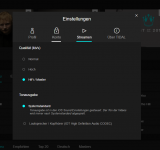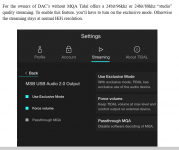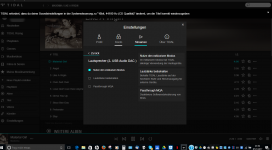Some comments on MQA by Jim Lesurf can be found here.
Thanks for the link.
If I understand correctly, one take away is that the design of MQA embodies the the assumption that that the extra HF information is actually of only marginal usefulness, given its share of the bit-budget, and also that 13-bit samples are good enough for the 0-48KHz that have been the foundation of consumer hi-fi digital audio.
Hi Everyone,
As you all know, Schiit, Benchmark and PS Audio have all weighed in on MQA.
I actually have an MQA capable DAC (Mytek Brooklyn) and listening via AKG K721 headphones heard it and have no evidence at all it does anything better. I have a thread going in Audiogon under the Music section.
There are some test files available from 2L.no/hires/ and after listening to 3 different tracks and comparing redbook, 96/24, DSD and MQA I cannot hear a damn thing better with MQA. What I do hear are different mixes, but this temporal debluring they are talking about I do not.
If anyone has a FREE track or tracks they feel are good exemplars please let me know.
Part of the challenge of evaluating MQA is that to do it right you need to remix. As soon as you do that, you are probably going to have to re-think a lot and won't get it right. Another part of this is that the 2L recordings I've heard are just not that good. Bright, congested treble, or ham-fisted level changes do not leave me impressed.
Best,
Erik
As you all know, Schiit, Benchmark and PS Audio have all weighed in on MQA.
I actually have an MQA capable DAC (Mytek Brooklyn) and listening via AKG K721 headphones heard it and have no evidence at all it does anything better. I have a thread going in Audiogon under the Music section.
There are some test files available from 2L.no/hires/ and after listening to 3 different tracks and comparing redbook, 96/24, DSD and MQA I cannot hear a damn thing better with MQA. What I do hear are different mixes, but this temporal debluring they are talking about I do not.
If anyone has a FREE track or tracks they feel are good exemplars please let me know.
Part of the challenge of evaluating MQA is that to do it right you need to remix. As soon as you do that, you are probably going to have to re-think a lot and won't get it right. Another part of this is that the 2L recordings I've heard are just not that good. Bright, congested treble, or ham-fisted level changes do not leave me impressed.
Best,
Erik
easp
I would word it a little differently, but you have it. It's also, according to Benchmark's post, lossy.
If you think of which notes get the most data per cycle, it's bass. A 44 Hz cycle will have about 1,000 samples, but a 4.4 kHz cycle only 10, and so on. So the idea of altering the encoding to better match the signals makes some sense to me. It's a bit like thinking of MPEG. If you know how the data is organized you can come up with more clever solutions. The other thing is, bass is where the bits are. Bass soaks up all the bits, but treble doesn't have the dynamic range at all.
However, based on Benchmark's take, it's more complicated than that, and the result will be lossy. Based on my listening, there's no audible benefit. If anything, I seem to like DSD more.
Best,
Erik
I would word it a little differently, but you have it. It's also, according to Benchmark's post, lossy.
If you think of which notes get the most data per cycle, it's bass. A 44 Hz cycle will have about 1,000 samples, but a 4.4 kHz cycle only 10, and so on. So the idea of altering the encoding to better match the signals makes some sense to me. It's a bit like thinking of MPEG. If you know how the data is organized you can come up with more clever solutions. The other thing is, bass is where the bits are. Bass soaks up all the bits, but treble doesn't have the dynamic range at all.
However, based on Benchmark's take, it's more complicated than that, and the result will be lossy. Based on my listening, there's no audible benefit. If anything, I seem to like DSD more.
Best,
Erik
Last edited:
I listened. I use a HP Pavilion g7 with Googe Chrome. The DA converter is a Musical Fidelity VDAC 2, heavy modified over USB. The sound i get is very good. It is too early to tell if this is better than CD quality but it is certainly not worse.
Over my own monitor speakers the sound is open and spacious.
There are limitations : at this moment MQA only works on desc top computers with Google Chrome. I could not get it working on my iPad. The choice of music is still sparse.
I only found around 10 titles that i like. I hope Tidal does not make the mistake and limits the amount of music too much. I think that killed DSD and HiRes PCM more than anything else.
Over my own monitor speakers the sound is open and spacious.
There are limitations : at this moment MQA only works on desc top computers with Google Chrome. I could not get it working on my iPad. The choice of music is still sparse.
I only found around 10 titles that i like. I hope Tidal does not make the mistake and limits the amount of music too much. I think that killed DSD and HiRes PCM more than anything else.
I will try to get me this one :
Meridian Explorer2 D/A headphone amplifier | Stereophile.com
Meridian Explorer2 D/A headphone amplifier | Stereophile.com
Reviews are comming out at a tight pace. I expected that.
Mono and Stereo High-End Audio Magazine: TIDAL Master quality first impressions!
For non MQA DACs there seems to be a new higher sampling rate mode.
I will try that out tomorrow.
Mono and Stereo High-End Audio Magazine: TIDAL Master quality first impressions!
For non MQA DACs there seems to be a new higher sampling rate mode.
I will try that out tomorrow.
Sure, you never know. That was the problem with SACD too.
This also had to happen :
CES 2017: Major Hi-Res Breakthroughs | Stereophile.com
This also had to happen :
CES 2017: Major Hi-Res Breakthroughs | Stereophile.com
Now i am really confused :
MQA: Questions and Answers | Stereophile.com
There's nice reference at the end of this article, which I managed to download in full thanks to still being a student at old age... an exceptional read.
"Human Time-Frequency Acuity Beats the Fourier Uncertainty Principle", Jacob N. Oppenheim and Marcelo O. Magnasco, Laboratory of Mathematical Physics, Rockefeller University, New York, New York 10065, USA, (Received 24 August 2012; revised manuscript received 13 November 2012; published 23 January 2013)
Last edited:
Okay, so this business of "auditory time resolution" or "twig-snap response," presumably measured in the 5-10 uS range, just sounds like latency to me. Why is it important to be able to sample that? Am I missing something? 
Last edited:
- Status
- This old topic is closed. If you want to reopen this topic, contact a moderator using the "Report Post" button.


